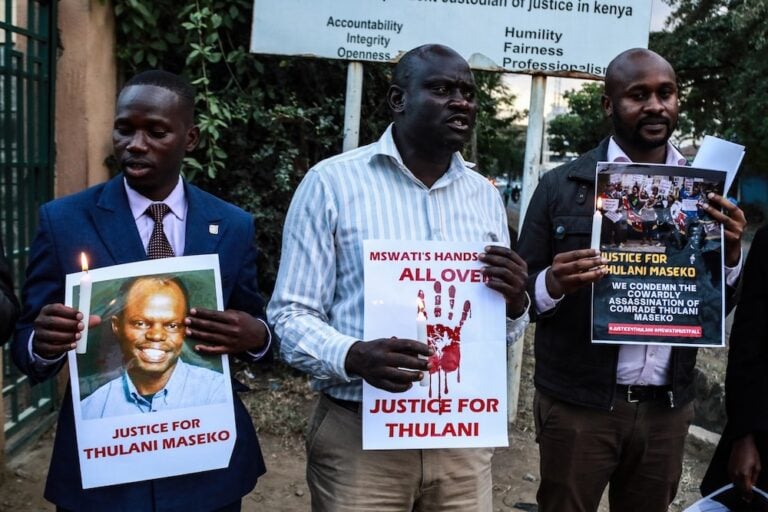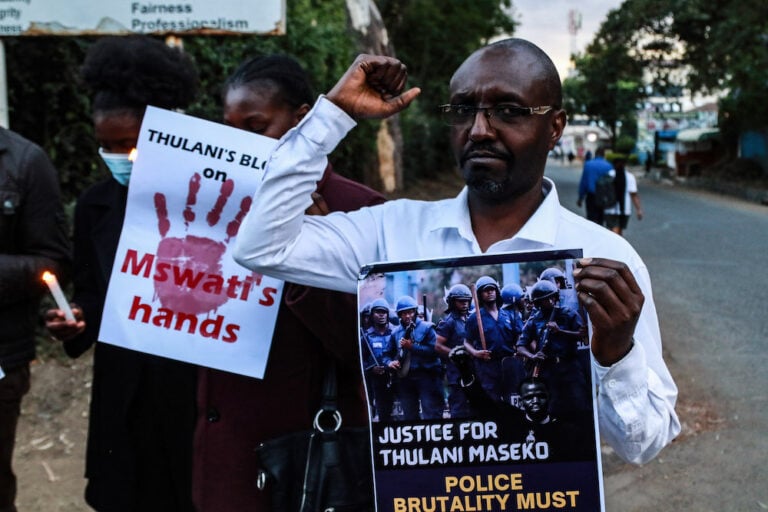(MISA/IFEX) – The director of public prosecutions (DPP) in Swaziland, Lincoln Ng’arua, stated that his office is considering pressing charges against other staff members of the “Times of Swaziland” for allegedly publishing defamatory articles about the newest fiancee of King Mswati III. Quoted in the “Swazi Observer” of 28 September 1999, Ng’arua said the DPP […]
(MISA/IFEX) – The director of public prosecutions (DPP) in Swaziland,
Lincoln Ng’arua, stated that his office is considering pressing charges
against other staff members of the “Times of Swaziland” for allegedly
publishing defamatory articles about the newest fiancee of King Mswati III.
Quoted in the “Swazi Observer” of 28 September 1999, Ng’arua said the DPP
might decide to also charge the publisher, and other staff members who might
have published such articles, jointly with “Times Sunday” Editor Bheki
Makhubu, or separately. Ng’arua added that the DPP could also revisit any
other publications by the Times group of newspapers to find out if there
were any other defamatory articles against the Liphovela (fiancee) to the
King.
On 27 September, Makhubu was released from police custody shortly after
posting bail of 3 000 Emalangeni (approximately US$500). He was charged with
two counts of “publishing defamatory libel” stemming from articles which
appeared in the 12 and 19 September editions of the “Times Sunday”. Both
articles referred to the Liphovela, Senteni Masango, as a high school drop
out. The trial was set for 4 October.
In arguments presented before the court on 27 September, lawyers for the
crown (state) indicated that in addition to the charges of defamation, they
would allege aggravating circumstances against Makhubu, viz:
1. That no apology had been made despite protests from many quarters;
2. That the defamation was widely published;
3. That the defamation was aimed at bringing the royal household into
disrepute;
4. That the person defamed had a position close to His Royal Majesty the
King of Swaziland;
5. That the defamation was of an extra-ordinary nature;
6. That the defamation had become one of the public moment and of public
concern; and
7. That the defamation was of such a magnitude as to be regarded as an
offence against the community (as well as against the individual).
Meanwhile, the “Swazi Observer” reports that there is confusion about the
law under which Makhubu has been charged. An offence of “publishing
defamatory libel” apparently does not exist on the Swazi statute books,
while South African Criminal Law, which is also used by the Swazi courts,
only stipulates a charge of defamation. The South Africa Common Law of
Crimes also does not stipulate a minimum sentence which Makhubu may face if
convicted. The law entitles the presiding judicial officer to discretionary
powers when imposing an appropriate sentence.
However, Swazi Prime Minister Sibusiso Dlamini has indicated that the law
being used in this case was old and dates back to the colonial era.
Addressing a 27 September media conference, he admitted that most people
were not aware that such a law existed. Responding to questions about
whether the arrest and charging of Makhubu challenged press freedom in the
kingdom, Dlamini said the matter was not a press freedom issue as there were
no laws in the country limiting press freedom and that no journalists were
in jail because of their views. He added however that Swaziland, like any
other country, was concerned about the media invasion of the privacy of
public figures. He further stressed that the reports carried in the “Times
Sunday” about the Liphovela were an offence because they were disrespectful
of the king.
In another development, the Ad-hoc Committee on the Media Council Bill, made
up of various media and civil society representatives in Swaziland, has
criticised Minister of Public Service and Information Magwagwa Mdluli, for
going ahead with plans to redraft the Media Council Bill and draft new
legislation covering defamation. In a statement, the committee said that
these actions were contrary to recommendations made to the minister earlier
this year, where they called, among others, on the minister not to go ahead
with any new legislation affecting the media without due consultation. The
recommendations stemmed from a retreat that was sponsored and sanctioned by
the ministry, media stakeholders and other civil society groupings. The
committee also decried the fact that the minister had failed to meet the
committee on several occasions in order to discuss their report and
recommendations. The Media Council Bill, which was mooted in late 1997,
contains harsh sanctions against journalists contravening a proposed
government-imposed code of ethics and media council. Following a huge
outcry, both locally and internationally, the bill was thrown out of
parliament and handed to a select committee to allow for further
consultation.
Background Information
On 12 September, the “Times Sunday” published an article entitled,
“Liphovela a High School Drop Out”, which reported that King Mswati III’s
latest fiancee was a high school dropout who had been de-registered from at
least two high schools because of truancy.
In the week following the publication of the story, Editor Makhubu came
under pressure from various quarters. On Wednesday 15 September, the story
was discussed in parliament, where Senate President Muntu strongly condemned
the way the story was handled by the paper, saying they were out to spoil an
otherwise good thing. The majority of senators then agreed that Prime
Minister Dlamini and Minister Mdluli should be summoned before the senate to
explain why the article had been allowed to be published.
On the same day, police visited Makhubu at his office and requested that he
make a statement on three points they presented. First, they wanted to know
the source of his information. Secondly, they wanted him to make a statement
explaining how, according to his editorial opinion, he thought it was a good
story to publish, and finally, they wanted him to explain what the words
“drop out” actually meant. Makhubu declined to make a statement or answer
the questions, and the police left saying that they would seek a court order
to force him to answer their questions.
On 17 September, Public Service and Information Minister Mdluli confirmed
that a private law firm had been employed to draft legislation on defamation
of character that would be tabled in parliament with a Certificate of
Urgency on Monday 20 September. This threat, however, did not materialise,
although plans for the new legislation remain in the pipeline.
On 19 September, the “Times Sunday” published a front page photograph
juxtaposing one of the king’s wives at a graduation ceremony with that of
the Liphovela and again referred to her as a high school drop out.
On 20 September, the management of the “Times” suspended Makhubu as editor
of the Sunday paper. The general manager of the “Times”, Pat Nxumalo, said
the action was taken after Makhubu was apparently warned by management not
to print anything about the king’s fiancee. Makhubu, however, denied ever
receiving such a warning from management. It is believed that Makhubu will
face a disciplinary hearing. In the meantime, publication of the “Times
Sunday” has also ceased, apparently because of plans to restructure the
paper. The last issue of the “Times Sunday” was published on 19 September.
On 23 September, Nxumalo and the director of the Swaziland Broadcasting and
Information Services (SBIS), Tars Makama, were summoned to appear before
elders at the main Royal Residence at Ludzidzini. During the meeting, which
was held behind closed doors, the Indvuna (governor) of Ludzidzini, Dibanisa
Mavuso, reportedly sternly warned the media representatives to respect the
monarchy. Referring to the Liphovela stories, Mavuso said a lady who had
been chosen by the king should not be defamed or described negatively. He
urged journalists to show respect at all times because it was their duty to
promote peace in the country. He added that the rule of law would take its
course in future if such negative reporting continued.
Afterwards, Nxumalo said that his newspaper would exercise respect towards
the king as suggested by the elders during the meeting. He added that press
freedom did exist in the kingdom, despite the fact that media chiefs were
sometimes summoned to explain certain articles or broadcasts.
On 26 September, Makhubu was arrested by police and held in jail overnight.
He was released on E3 000 (approximately US$500) bail on 27 September, and
ordered to surrender his travel documents, to report to the police every
fortnight and refrain from publishing information relating to the king’s
Liphovela.
Recommended Action
Send appeals to authorities:
contemplated against the publisher and other journalists
been chosen by the king as his new bride
all royalty in Swaziland, will come from public funds since the Swaziland
National Trust Commission, from which the Royal family draws its funds, is
directly financed by the government
entitled to less protection from critical commentary than an ordinary member
of the public
charges and summoning of media representatives to the Royal residence, and
pointing out that such harassment is in violation of numerous international
treaties and conventions which accept the right to freedom of expression
and the right to receive and impart information
and allow for public input, which would be in line with acceptable
procedures of democratic governance
Appeals To
Sibusiso Dlamini
The Hon. Prime Minister
Fax: +268 40 43943Minister of Public Service and Information
Senator Magwagwa Mdluli
Fax: +268 40 45379
Recommended Action
Send appeals to the management of the Swazi Times:
outside interference in the editorial matters of the paper
on freedom of expression in the newspaper, which may inevitably affect the
Swazi people’s right to be properly informed
society by failing to fully scrutinize and report on the actions of public
officials, particularly where public interest demands such disclosure and
even if this may be sensitive
Appeals To
Paul Loffler
Managing Director of the Times of Swaziland
Fax: +268 40 42438Pat Nxumalo
General Manager of the Times of Swaziland
Fax: +268 40 42438
Please copy appeals to the source if possible.


